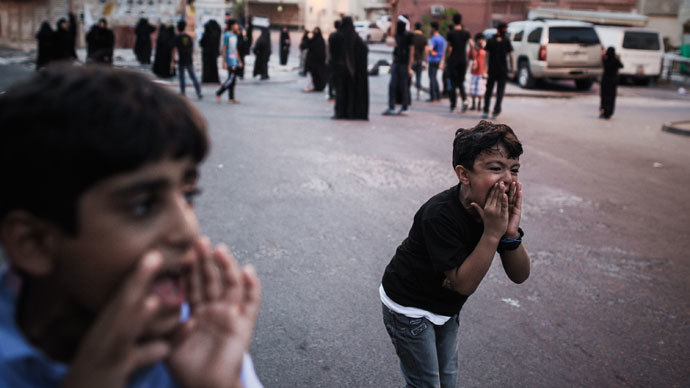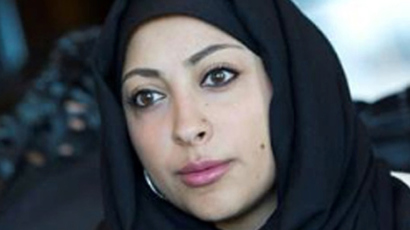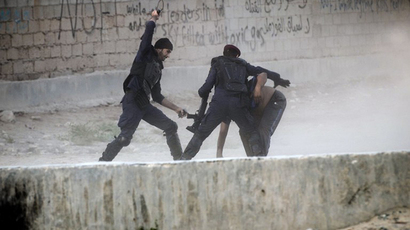HRW: Bahrain security forces detain, abuse children

Bahrain’s law enforcement has made a habit of regularly detaining children, who are forced to undergo humiliation and cruel treatment often bordering on torture, according to victim, family and activist reports compiled by Human Rights Watch(HRW).
The testimonies reveal that children are being held for as
long as adults and suffer the same amount of bodily harm, which
often includes beatings. This is further supplemented by the
denial to detainees of their basic rights to an attorney or a
social worker, and the fact that many confessions are simply
forced out of minors by Bahrain’s security apparatus.
At the very least this goes against the Convention on the Rights
of the Child, which emphasizes governments’ responsibility to
protect children under 18 from such practices.
Joe Stork, acting Middle East and North Africa director at HRW,
says that “Rounding up kids, throwing them in jail and beating
and threatening them is no way for a country to treat its
children… The Bahraini authorities need to look into these
allegations and immediately call a halt to any arbitrary arrests
and mistreatment of children.”
The Bahrain Center for Human Rights has issued condemnation for
these continued attacks on the families of political dissidents
and their children. They have been going on since the
unsuccessful Bahraini Arab Spring of 2011.
But sporadic unrest continues and anti-government sentiments
attract a vast number of underage youths. August saw 15
detentions, the Bahrain Center for Human Rights told HRW. And
they happen in such numbers that there are no resources to
document each one and ascertain whether they were carried out in
line with the law. The Bahrain Youth Society for Human Rights
listed 22 arrests since the start of August.

One testimony was related to an incident that took place at a
swimming pool some youngsters had rented to enjoy one final night
before school started. Having arrived at 4am, the police tied
them up and kicked them around before taking them to a detention
center. No attorneys or social workers were provided and the
boys’ parents only found out four days later where their children
were being held. All this was done for the purpose of extracting
a confession from the group that they were involved in attacking
a police building with Molotov cocktails.
Another incident involved the early morning arrest of, Ali
Rustam, 15, on September 8. His parents still haven’t had any
contact with him, a situation made all the worse by the fact that
Ali has diabetes and requires four daily injections of insulin.
In one extreme case, police allegedly promised a lawyer they
would “look into it” when he asked for leniency towards
his client because he was a minor. That minor was taken to a
detention facility where he spent 45 days before being released
on bail.
Sayed Alwadaei was detained twice, each time alleging he was
tortured. The first happened when he was still 17 – a child under
international law. The 45 days he was kept in detention were
spent together with adult prisoners as the children’s wing was
full, police claimed.
The second time Alwadaei was arrested was in his car, with
friends. Non-uniformed police units pulled him over on a supposed
warrant for his arrest, but instead of taking him to a police
station as they said they would, he was transferred to the
Criminal Investigations Unit (CID). There he was handcuffed,
blindfolded and accused of burning tires at a protest, which he
denied at first.

But as Alwadaei told HRW, the rules seemed to go, “In this
place, you have no choice… you confess to whatever they want you
to.” He was allegedly threatened with rape if he did not
comply. After forcing the confession out of him, the boy was held
another 15 days and again released on bail. He is now due to face
trial on charges of illegal gathering and inciting hatred against
the regime.
The numerous cases all involve unnecessary beatings, forcefully
extracted confessions, as well as police cover-ups of these
practices.
June 2011 saw a review of Bahrain’s adherence to the Convention,
and it was less than satisfactory. The Committee on the Rights of
the Child had underlined “with concern reports according to
which torture and other forms of ill-treatment were used by the
state party during the recent political events.”
Two years on, in 2013, The European Parliament on September 12
has issued a fresh resolution on the country’s progressively
worsening human rights situation, where it recommends that the
government “respect the rights of juveniles, to refrain from
detaining them in adult facilities, and to treat juveniles in
accordance with the Convention on the Rights of the Child, to
which Bahrain is a party.”
Human Rights Watch says more than 80 people have died in
uprisings since they began in February 2011, when a Shiite-led
uprising against the Sunni Khalifa dynasty resulted in security
forces crushing the revolt and killing dozens in the process.
Sporadic unrest has been going on since.
One of the most vocal critics of the government, activist Nabeel
Rajab, has been serving a three-year term in jail since August
2012.
Recently the government has allowed the public to hold sanctioned
peaceful protests – and the people do that – but life in Bahrain
appears to be a long way from changing, with many continuing to
see the reforms as window-dressing, while all decision-making
powers continue to rest with the monarchic regime.














